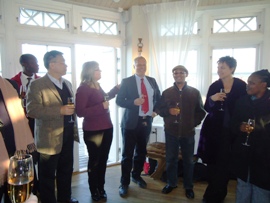
Professor Heila Lotz-Sisitka from the Environmental Learning Research Centre and Amanda Hlengwa from the Centre of Higher Education Research, Teaching and Learning (CHERTL) have just returned from three weeks in Sweden where they were co-facilitating an International Training Programme (ITP) on Education and Sustainable Development in Higher Education. The programme involves 25 Higher Education institutions from Asia and Africa. Its purpose, says Lotz-Sisitka, is to “...encourage universities to think critically about global social-ecological challenges, and the implications of these for local contexts and disciplines”. Participants on the ITP are actively encouraged and supported to critically review their own teaching, research and/or community engagement practices and to reflexively engage in emergent processes of change.
The programme is a response to the increasing realisation that social-ecological relationships have been neglected in most modern education systems, including in many of the disciplines in Higher Education. The programme is also part of a wider social movement that is oriented towards ‘strong sustainability’ or an approach to development that takes adequate account of the ecology-society-economy nexus. It also responds to an emerging ‘bottom up’ trend towards integrating environmental and sustainability concerns into Higher Education institutions in Africa, Asia and elsewhere, across disciplines such as law, sociology, education, theology, science, politics and others.
The Rhodes Environmental Learning Research Centre’s research on models of reflexive professional development in adult and higher education has substantively influenced the curriculum structure and orientation of the programme. “Change-oriented learning lies at the heart of the programme”, says Lotz-Sisitka, and this “... requires people to reflect critically on own context, theory and practice in relation to wider social-ecological changes and new theory and practice”.
Engaging with numerous complex sustainability issues such as resilience of contemporary social-ecological systems; climate change; water scarcity; and new forms of ecological economics provides an interesting new knowledge environment, where traditional disciplines are ‘changing form’ in response to new and different understandings of the kind of knowledge required in late modern societies. Hlengwa reflects “we have an intensely stimulating learning environment sparked by engaging presentations, in which the ideas and concepts presented are then taken up and elaborated on by the academics in the group”. Academics from different disciplines, and different country and indeed continental contexts are deliberating the relationships between education and sustainable development.
During the time in Sweden the group spend two days with the Stockholm Resilience Centre, two days with curriculum and education for sustainable development researchers from Uppsala university; and a week in Gothenberg with Chalmers University of Science and Technology. This programme is constituted as a collaborative initiative between Rhodes University, Tonjii University in China, Uppsala University, The Stockholm Resilience Centre at Stockholm University, and Chalmers University in Gothenberg. The programme is funded by Sida, and implmented by Ramboll Natura who organise and manage the International Training Programme.
In October, Rhodes University will host 25 academics from universities in Ethiopia, Zambia, Swaziland, Botswana and Uganda; the African university participants. The ELRC and CHERTL are collaborating internally to ensure that higher education expertise is brought together with environmental education expertise.
